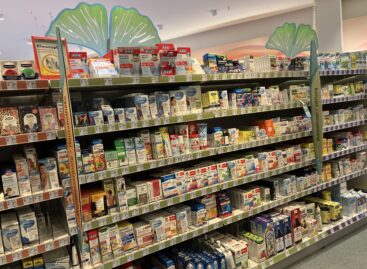Magazine: Self-service at the checkout
According to a BBC survey conducted in the autumn of 2015, shop assistants ranked 51st on a list of 366 jobs most likely to be replaced with robots. Scientists say there is a 90-percent probability that automatic machines will do the work of shop assistants in the future. In Hungary Tesco and IKEA have already installed self-service checkouts and many retailers are considering the option of solving the problem of shop staff shortage – especially now that they are open again on Sundays – with installing automatic cash registers. Spar’s head of communications Márk Maczelka told us that early next year self-service checkouts will appear in selected Interspar stores. Auchan’s Zsófia Samu didn’t rule out applying such solutions either.
Laurel Group owner and managing director István Bessenyei told our magazine that they are proud to have been part of the Hungarian debut of self-service cash registers, successfully introduced by Tesco. What hinders the technology’s breakthrough is that a retailer can’t start with a test period of 1-2 self-service cash registers as this would cost just as much as installing 100-150 of them. Szintézis CEO Dávid Szabó informed that their portfolio also contains self-service cash registers (or in another name self-checkouts – abbreviated as SCO). Szintézis’ ITAB solution offers a wide range of possible uses, depending on store size. Mr Bessenyei added that now that shops are open again on Sundays, many retailers might want to install self-checkouts instead of having to pay extra rates to cashiers for working on Sundays.
Mr Szabó is of the opinion that SCO use is a long-term investment. For instance thanks to automatic cash registers, shop assistants can focus more on serving customer needs better, while in less busy periods much fewer cashiers are enough at the checkout. He thinks SCO is the future as shoppers are also getting to like these fast and comfortable systems. Mr Bessenyei reckons that one of the self-service checkout’s biggest advantages is that it is very efficient in managing the peak hours, and it is also more comfortable to pay at one of these than at traditional tills. Most shoppers say it is easy to get used to the self-service checkout. He opines that SCOs best suit the needs of hypermarkets, but they provide an excellent solution in small shops, where the turnover is high but the basket value is low.
In the domain of self-checkout NCR is Laurel’s technological partner, because they make very reliable devices. International experience is that only a small proportion of automatic cash registers go wrong. NCR has already come out with the 6th generation of their system, for instance in the latest version it doesn’t matter how the customer holds the product, the scanner can read the price easily. As for the ITAB portfolio, it even contains a fully automatic cash register that identifies products without a barcode or any other marking, therefore the risk of making mistakes is minimised. Another interesting solution is a hybrid system, which can be easily transformed from a self-service checkout to a traditional cash register.
Our magazine asked Tesco and IKEA about their experiences with self-checkouts. At the moment from Tesco’s 3,000 cash registers 519 are SCOs. This form of paying for goods bought will soon appear in smaller Tesco stores too. SCOs popularity with shoppers has been growing ever since their introduction. They are most frequently used by those who purchase 1-15 items. IKEA installed their first automatic cash registers in October 2015: there are 16 of these in addition to the 15 traditional tills working in the Örs vezér Square store. In the Budaörs store there are 14 traditional cash registers and 12 SCOs. IKEA’s goal is to put an SCO next to each traditional checkout. IKEA customers like them very much. Rather surprisingly older customers use them most actively. //
Related news
Related news
WHO: They urge a 50 percent price increase for tobacco, alcohol and sugary drinks
The World Health Organization (WHO) is calling for the prices…
Read more >Eurozone economic growth accelerated in June
The eurozone’s economic performance accelerated in June, according to the…
Read more >This is how drug prices are changing: the government introduced price restrictions
The Ministry of National Economy’s price restrictions on medicines came…
Read more >



